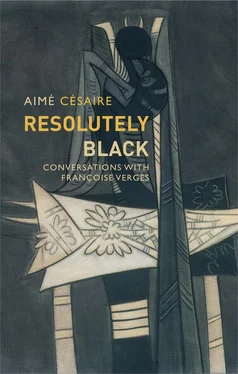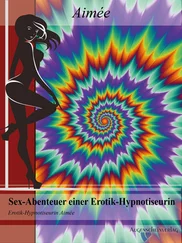1 Series title Series title Critical South The publication of this series was made possible with the support of the Andrew W. Mellon Foundation Nelly Richard, Eruptions of Memory Néstor Perlongher, Plebeian Prose Bolívar Echeverría, Modernity and “Whiteness” Eduardo Grüner, The Haitian Revolution Aimé Césaire, Resolutely Black
2 Title page Resolutely Black Conversations with Françoise Vergès Aimé Césaire Translated by Matthew B. Smith polity
3 Copyright page
4 Note on the Translation Notes
5 Preface by Françoise Vergès Notes
6 Conversations Notes
7 Postface by Françoise Vergès Césaire and Slavery Césaire and Colonialism Césaire’s Relevance Today Notes
8 Works by Aimé Césaire in English
9 End User License Agreement
1 Cover
2 Contents
3 Conversations
1 ii
2 iii
3 iv
4 vi
5 vii
6 viii
7 ix
8 x
9 xi
10 84
11 xii
12 xiii
13 xiv
14 xv
15 xvi
16 xvii
17 xviii
18 xix
19 xx
20 xxi
21 xxii
22 xxiii
23 85
24 86
25 1
26 2
27 3
28 4
29 5
30 6
31 7
32 8
33 9
34 10
35 11
36 12
37 13
38 14
39 15
40 16
41 17
42 18
43 19
44 20
45 21
46 22
47 23
48 24
49 25
50 26
51 27
52 28
53 29
54 30
55 31
56 32
57 33
58 34
59 35
60 36
61 37
62 38
63 39
64 40
65 41
66 42
67 43
68 87
69 88
70 44
71 45
72 46
73 47
74 48
75 49
76 50
77 51
78 52
79 53
80 54
81 55
82 56
83 57
84 58
85 59
86 60
87 61
88 62
89 63
90 64
91 65
92 66
93 67
94 68
95 69
96 70
97 71
98 72
99 73
100 74
101 75
102 76
103 77
104 78
105 79
106 80
107 81
108 89
109 90
110 91
111 92
112 93
113 82
114 83
Series title
Critical South
The publication of this series was made possible with the support of the Andrew W. Mellon Foundation
Nelly Richard, Eruptions of Memory
Néstor Perlongher, Plebeian Prose
Bolívar Echeverría, Modernity and “Whiteness”
Eduardo Grüner, The Haitian Revolution
Aimé Césaire, Resolutely Black
Resolutely Black
Conversations with Françoise Vergès
Aimé Césaire
Translated by Matthew B. Smith
polity
First published in French as Nègre je suis, nègre je resterai : Entretiens avec Françoise Vergès , © Albin Michel, 2005
This English edition © Polity Press, 2020
Excerpt from Aimé Césaire’s The Tragedy of King Christophe reproduced by kind permission of Northwestern University Press and Présence Africaine Éditions. Translation copyright © 2015 by Paul Breslin and Rachel Ney. Translation published 2015 by Northwestern University Press. Originally published in French under the title La tragédie du roi Christophe. Copyright © 1963 by Présence Africaine Éditions. All rights reserved.
Polity Press
65 Bridge Street
Cambridge CB2 1UR, UK
Polity Press
101 Station Landing
Suite 300
Medford, MA 02155, USA
All rights reserved. Except for the quotation of short passages for the purpose of criticism and review, no part of this publication may be reproduced, stored in a retrieval system or transmitted, in any form or by any means, electronic, mechanical, photocopying, recording or otherwise, without the prior permission of the publisher.
ISBN-13: 978-1-5095-3714-3
ISBN-13: 978-1-5095-3715-0 (pb)
A catalogue record for this book is available from the British Library.
Library of Congress Cataloging-in-Publication Data
Names: Césaire, Aimé, interviewer. | Vergès, Françoise, 1952- interviewee. | Smith, Matthew B., translator.
Title: Resolutely black : conversations with Françoise Vergès / Aimé Césaire ; translated by Matthew B. Smith.
Other titles: Nègre je suis, nègre je resterai. English
Description: Cambridge, UK ; Medford, MA : Polity, 2020. | Series: Critical South | Includes bibliographical references and index. | Summary: “Aimé Césaire’s work is foundational for colonial and postcolonial thought. In this unique volume, his responses to Françoise Vergès’ questions range over the origins of his political activism, the legacies of slavery and colonialism, the question of reparation for slavery and the problems of marrying literature to politics”-- Provided by publisher.
Identifiers: LCCN 2019029720 (print) | LCCN 2019029721 (ebook) | ISBN 9781509537143 (hardback) | ISBN 9781509537150 (paperback) | ISBN 9781509537167 (epub) | ISBN 9781509539307 (pdf)
Subjects: LCSH: Césaire, Aimé--Interviews. | Authors, Martinican--20th century--Interviews. | Negritude (Literary movement) | Postcolonialism.
Classification: LCC PQ3949.C44 Z4613 2020 (print) | LCC PQ3949.C44 (ebook) | DDC 841/.914--dc23
LC record available at https://lccn.loc.gov/2019029720
LC ebook record available at https://lccn.loc.gov/2019029721
Typeset in 11.5 on 15 pt Sabon
by Fakenham Prepress Solutions, Fakenham, Norfolk NR21 8NL
Printed and bound in Great Britain by TJ International Limited
The publisher has used its best endeavours to ensure that the URLs for external websites referred to in this book are correct and active at the time of going to press. However, the publisher has no responsibility for the websites and can make no guarantee that a site will remain live or that the content is or will remain appropriate.
Every effort has been made to trace all copyright holders, but if any have been overlooked the publisher will be pleased to include any necessary credits in any subsequent reprint or edition.
For further information on Polity, visit our website: politybooks.com
Translating race is no easy matter. This is because, at once a social construct and a lived reality, race is experienced differently in different contexts. To be black means something different in France, and in Francophone countries, than it does in the United States and the Anglophone world. This point – as intuitive and commonsensical as it may seem – is far too often lost in translation.
Efforts to overcome these differences linguistically risk oversimplifying the diversity of black experience. Take the English term “black” itself, for instance, which was widely used in France in the 1990s and early 2000s in place of the French term noir . Proponents of the English term saw in its use a sense of belonging to a larger, international black community, one that evoked the civil rights movement in the United States, which knows no equivalent in France. But critics saw it as an unnecessary euphemism – why use an English expression when a French one already exists? – and a refusal to acknowledge race openly. Noir has since reemerged as the term most frequently used to speak of black experience in France.
But what does it mean to be black in France, or even in French, for that matter? France, casting itself as a color-blind society, officially rejects race as a category and even prohibits the collection of census data according to race. The lack of statistics relating to race, however, does little to hide the brute reality of racism, which proves the extent to which race is very much a category that matters in France. To be black in France, many have argued, is thus “primarily a response to and rejection of anti-black racism.” 1If the English term “black” allowed the French to ignore race, noir , many believe, takes a step in openly acknowledging it. Still, the question of whether “black” adequately translates noir or noir adequately translates “black” remains unsettled.
Читать дальше












